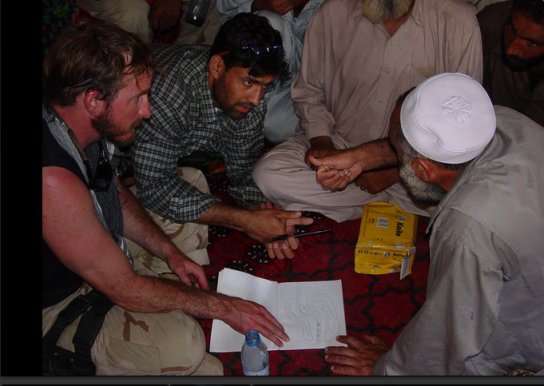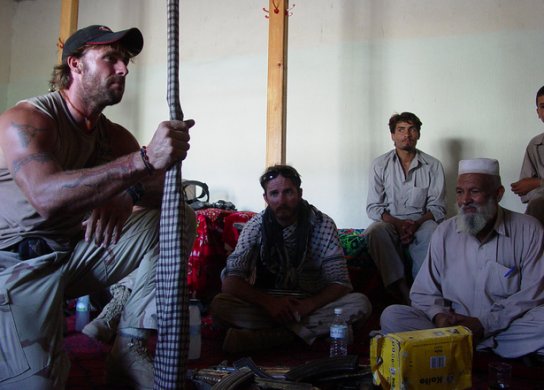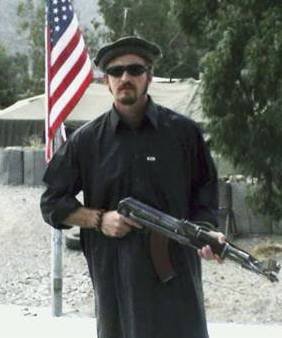« Obama Bashes Brown and Scott Browns Crowd and Support Grows Stronger | Main | MSNBC's Ed Schultz- I'd Cheat To Keep Brown From Winning In Mass. »
January 18, 2010
U.S. Army Maj. Jim Gant The Green Beret

.

.

Jim Gant, the Green Beret who could win the war in Afghanistan
Sunday, January 17, 2010
It was the spring of 2003, and Capt. Jim Gant and his Special Forces team had just fought their way out of an insurgent ambush in Afghanistan's Konar province when they heard there was trouble in the nearby village of Mangwel. There, Gant had a conversation with a tribal chief -- a chance encounter that would redefine his mission in Afghanistan and that, more than six years later, could help salvage the faltering U.S. war effort.
Malik Noorafzhal, an 80-year-old tribal leader, told Gant that he had never spoken to an American before and asked why U.S. troops were in his country. Gant, whose only orders upon arriving in Afghanistan days earlier had been to "kill and capture anti-coalition members," responded by pulling out his laptop and showing Noorafzhal a video of the World Trade Center towers crumbling.
That sparked hours of conversation between the intense 35-year-old Green Beret and the elder in a tribe of 10,000. "I spent a lot of time just listening," Gant said. "I spoke only when I thought I understood what had been said."
In an unusual and unauthorized pact, Gant and his men were soon fighting alongside tribesmen in local disputes and against insurgents, at the same time learning ancient tribal codes of honor, loyalty and revenge -- codes that often conflicted with the sharia law that the insurgents sought to impose. But the U.S. military had no plans to leverage the Pashtun tribal networks against the insurgents, so Gant kept his alliances quiet.
No longer. In recent months, Gant, now a major, has won praise at the highest levels for his effort to radically deepen the U.S. military's involvement with Afghan tribes -- and is being sent back to Afghanistan to do just that. His 45-page paper, "One Tribe at a Time," published online last fall and circulating widely within the U.S. military, the Pentagon and Congress, lays out a strategy focused on empowering Afghanistan's ancient tribal system. Gant believes that with the central government still weak and corrupt, the tribes are the only enduring source of local authority and security in the country.
"We will be totally unable to protect the 'civilians' in the rural areas of Afghanistan until we partner with the tribes for the long haul," Gant wrote.
A decorated war veteran and Pashto speaker with multiple tours in Afghanistan, Gant had been assigned by the Army to deploy to Iraq in November. But with senior military and civilian leaders -- including Defense Secretary Robert M. Gates; Gen. Stanley McChrystal, the top U.S. commander in Afghanistan; and Gen. David Petraeus, the head of U.S. Central Command -- expressing support for Gant's views, he was ordered instead to return to Afghanistan later this year to work on tribal issues.
"Maj. Jim Gant's paper is very impressive -- so impressive, in fact, that I shared it widely," Petraeus said, while McChrystal distributed it to all commanders in Afghanistan. One senior military official went so far as to call Gant "Lawrence of Afghanistan."
The abrupt about-face surprised the blunt-spoken major. "I couldn't believe it," Gant said in a recent interview, recalling how his orders were canceled just days before he was set to deploy to Iraq. "How do I know they are serious? They contacted me. I am not a very nice guy. I lead men in combat. I am not a Harvard guy. You don't want me on your think tank."
Gant, who sports tattoos on his right arm featuring Achilles and the Chinese characters for "fear no man," is clearly comfortable with the raw violence that is part of his job. An aggressive officer, he is known to carry triple the ammunition required for his missions. (One fellow soldier referred to this habit as a "Gantism.") But he is equally at ease playing for hours with Afghan children or walking hand-in-hand with tribesmen, as is their custom.
As a teenager in Las Cruces, N.M., Gant was headed to college on a basketball scholarship and had no plans to join the military until he read Robin Moore's 1965 fictionalized account of Special Forces actions in Vietnam. Captivated by the unique type of soldier who waged war with indigenous fighters, Gant decided to become a Green Beret and scheduled an appointment with his father, a middle school principal, to break the news.
Enlisting in the Army soon after his high school graduation, Gant became a Special Forces communications sergeant and fought in the Persian Gulf War. Later, as a captain, he served combat tours in Afghanistan in 2003 and 2004, and one in Iraq during the height of the violence there in 2006 and 2007.
Intellectually, Gant is driven by a belief that Special Forces soldiers should immerse themselves in the culture of foreign fighters, as British officer T.E. Lawrence did during the 1916-1918 Arab revolt. In Iraq as well as in Afghanistan, Gant relied on his Special Forces training to build close bonds with local fighters, often trusting them with his life.
In Iraq in December 2006, a roadside bomb flipped over Gant's Humvee twice and left it engulfed in flames, with him pinned inside. Members of the Iraqi National Police battalion that Gant was advising pulled him out. Soon afterward, Gant led those same police in fighting their way out of a complex insurgent ambush near the city of Balad, saving the lives of two policemen and an Iraqi girl while under heavy fire, and deliberately driving his Humvee over two roadside bombs to protect the police riding in unarmored trucks behind him.
Gant earned a Silver Star for his bravery, but he remembers most the goat sacrifice the police held for him that day. "We had just won a great battle. We had several [police] commandos there, with several goats, and they were putting their hands in the blood, and putting their handprints all over us and on the vehicles," Gant recalled in a 2007 interview. He felt both strange and honored. "It's something I will never forget," he said.
Under Gant's plan, small "tribal engagement teams," each made up of six culturally astute and battle-tested Special Forces soldiers, would essentially go native, moving into villages with rifles, ammunition and money to empower tribal leaders to improve security in their area and fight insurgents. The teams would always operate with the tribes, reducing the risk of roadside bombs and civilian casualties from airstrikes.
The U.S. military would have to grant the teams the leeway to grow beards and wear local garb, and enough autonomy in the chain of command to make rapid decisions. Most important, to build relationships, the military would have to commit one or two teams to working with the same tribe for three to five years, Gant said.
Such a strategy, he argues, would bolster McChrystal's counterinsurgency campaign by tapping thousands of tribal fighters to secure rural populations, allowing international troops and official Afghan forces to focus on large towns and cities. Building strong partnerships with the tribes, whose domains straddle Afghanistan's border with Pakistan, could also prove critical to defeating insurgents entrenched in Pakistan's western tribal areas, he contends.
Adm. Eric Olson, who leads the 57,000-strong Special Operations Command, said in the latest issue of Joint Force Quarterly that Gant's proposal is "innovative and bold" and likely to have "strategic effects." And in recent congressional testimony, Gates agreed that the U.S. military should step up cooperation with Afghan tribes, saying many security responsibilities are likely to fall on them rather than the Afghan army or police force.
Thorough intelligence analysis should drive the selection of the tribes, Gant said, noting that the U.S. military has already gathered much of the intelligence. "There are 500-page documents breaking these tribes down. You would be shocked how much we know about who is who," he said.
Gant's proposals go well beyond the more cautious tribal-outreach efforts underway in Afghanistan, where the U.S. military is experimenting with neighborhood-watch-type programs such as the Community Defense Initiative, in which Special Forces teams partner with tribes selected by an Afghan minister. With time running out, Gant believes tribal engagement must be bolder. "We are trying not to lose, not trying to win," he said. (Gant's experiences helped shape the CDI effort, and he is currently preparing to return to Afghanistan to implement his vision, according to a senior military official.)
Still, Gant acknowledges that his strategy has risks. The teams would depend on the tribes for their safety. "American soldiers would die. Some of them alone, with no support. Some may simply disappear," he wrote in his paper on the strategy. Another possibility is that intertribal conflict would break out between two or more U.S.-backed tribes. "Could it happen? Yes. Could it cause mission failure? Yes. Could we have to pick sides for our own safety? Yes," Gant said. But he believes that if American advisers forge strong ties with the tribes, the chances of such conflicts can be minimized.
Gant's greatest fear is that the United States will lack the fortitude to back the tribes for the long haul, eventually abandoning them. He, for one, plans to stick with his tribe in Afghanistan, at least to fulfill a personal promise to return to Konar province to see elder Malik Noorafzhal, now 86.
"I am not here to imply that I think I could win the war in Afghanistan if put in charge," Gant wrote in his paper. ". . . I just know what I have done and what I could do again, if given the chance."
.
Wild Thing's comment........
Posted by Wild Thing at January 18, 2010 05:48 AM
Comments
It's a shame that our US Special Forces don't have the same roles as Caesar's Roman Legions had in the good old days when the Senate leaned too far to the LEFT? I'll play Barry Sadler's 'The Ballad of the Green Berets' 1966 hit today from his album that I found in a Goodwill Store yesterday for... $1.00! What a blessed find, eh?
Posted by: darthcrUSAderworldtour07 at January 18, 2010 12:04 PM
Major Gant's methods and plans are straight out of Special Forces training. Working with indigenous personnel to combat insurgents or guerrillas or to be such is at the core of the SF handbook.
This article reminds me of 2003 when Special Forces troopers joined with the Northern Alliance tribes and rode horseback across the Afghanstan plains to successfully chase down Taliban and Al Queda.
It is too bad that this article was written. Major Gant will now be targeted even more than if he had remained anonymous.
Posted by: TomR at January 18, 2010 12:20 PM
Way to go Major. This is what SF is all about. 1st Group, 051 '63-'66.
Posted by: Dave 18Zulu at January 18, 2010 12:26 PM
TomR, I feel the same way. I loved the story but it probably shouldn't have been published until the war is done. Not only Gant, but the elder Malik will carry a target as well.
Maj. Gant is one of our finest. God Bless our military men and women.
Posted by: Jim at January 18, 2010 04:53 PM
Amen TomR and Jim.
Posted by: Mark at January 18, 2010 07:37 PM
